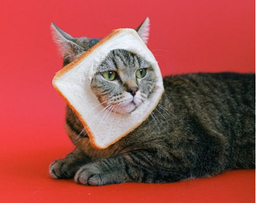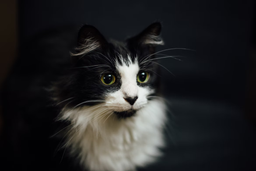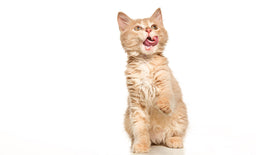Are you looking for the best sensitive cat food? Untamed delivers!
From studying feline nutrition to inspecting cat food labels like Sherlock Holmes, most cat parents are extra careful while shopping for their pet pantry. Despite all their efforts, many fail to find the right sensitive cat food for their delicate furballs.
A cat with a weak disposition may require a specific meal plan. Sometimes, even the priciest “safe food” can cause their stomachs to somersault. What starts as diarrhoea may soon turn into concerning weight loss, leaving you frustrated and clueless about what to do next. To make matters worse, many top brands offer nutritionally deficient products under the guise of sensitivity-friendly food for cats.
If you are trying to find the proper diet for your cat, Untamed has prepared an all-inclusive guide for you. We will:
- Help you understand how specific cat food calms digestive problems
- Give you practical tips to support your feline’s overall health
- Introduce you to the best cat food for sensitive digestion

But I’m not a sensitive crybaby, human! It’s my crummy tummy that feels weird!
Source: Lad Fury
Food for cats with a sensitive stomach—how is it different from regular cat food?
Most products available on the market fall under the regular cat food category—they may or may not work for cats under digestive distress. Food for sensitive cats should help felines with compromised digestion caused by:
- A temporary health problem
- A permanent medical condition
- Hypersensitivity to certain food items
- Age
Many cat parents wonder whether their cat needs expensive sensitive-tagged food or should they look into alternative feeding solutions.
Keeping your queries in mind, we have addressed some of the top issues about cat food sensitivity in the forthcoming sections.
The signs your cat needs sensitive stomach food
Being obligate carnivores, cats have a pretty strong digestive system producing all the enzymes necessary to digest a fresh kill in the wild. While domesticated cats enjoy robust digestion, they do face tummy issues more often.
According to most vets, cat parents need to keep an eye out for the following signs to determine if their cat suffers from a sensitive stomach:
- Prolonged or frequent gastrointestinal issues—For most cats, tummy troubles are a passing inconvenience. If your moggie suffers from frequent bouts of vomiting, watery stools, and stomach cramps, it might mean that:
- Their current diet is distressing their digestive system
- They have developed an illness or a food sensitivity
- Poor appetite—This is a side-effect of gastrointestinal slowdown. Cats with a sensitive digestive system may develop an aversion to food that causes them pain and discomfort
- Weight imbalances—If your cat is losing weight or has trouble gaining weight, it could be a hint that their system cannot absorb nutrients from food
- Hairballs and regurgitation—Regurgitation is different from vomiting. Cats regurgitate to remove undigested food from their system, including grass and excessive hair swallowed during grooming. Ideally, the hair should get ejected with faeces. Vets say that occasional hairballs (once or twice a month) are okay, but if the frequency is higher, it could be an indication of a sensitive stomach

Who’s worried about hairballs and watery stools? At least I’m cute.
Source: Cyrus Chew
Look beneath the surface—what sensitises a cat’s stomach, and can adequate nutrition make it better?
When looking for sensitive stomach cat food, it’s imperative to understand why your cat has problematic digestion. If they have an upset tummy because of a seafood allergy, but the sensitive cat food you’re buying contains fish as the base protein, it will only make things worse.
The food your delicate cat needs can be disguised under other names like “hypoallergenic,” “gluten-free,” “grain-free,” etc. You must decide based on the core factor that sensitises your cat’s gastrointestinal system, which can be:
- Allergy or intolerance
- Ageing
- Eating disorder
- Medical issue
We will evaluate the above factors and help you zero in on the sensitive stomach food that will help your feline companion.
Which products cause food allergy and food intolerance in cats?
Food allergy and food intolerance are two different issues. The following table will help you understand the difference:
|
Insight |
Food allergy |
Food intolerance |
|
Meaning |
Your cat’s immune system rejects a particular food, like:
|
Your cat doesn’t have the enzymes to digest specific items, such as:
|
|
Symptoms |
|
Unlike allergies, food intolerances always cause gastrointestinal disturbance: |
|
Solutions |
Look for hypoallergenic cat food. If your cat is allergic to a particular meat, choose a hypoallergenic food from an adequate meat source |
Recognise the problematic ingredient and make sure the brand you choose doesn’t use it |
Remember that many cats with no prior history of food allergy or intolerance can also get sick due to the contaminants present in their food, including:
- Artificial flavouring and additives
- Pesticides (may be present in cereal-rich food)
- Toxins from chemically farmed fish or factory-farmed meat
If you believe the chemicals in the food are harming your cat, switch to organic or ethical cat food brands and see if it benefits your furry companion.
The age factor behind food sensitivity and how to address it
Cats lose their digesting abilities with age, which turns them into picky eaters struggling to adapt to a weaker digestive system. Senior cats need easily digestible cat food that:
- Has a soft texture (soft cat food may be good for their sensitive stomachs and dental health)
- Delivers adequate calories to compensate for the dip in their energy levels
- Contains low-fat, lean proteins that break down effortlessly and postpone muscle loss
While buying cat food for older cats with sensitive stomachs, consider getting nutritionally balanced wet food. Older cats tend to develop kidney and urinary conditions due to low hydration, and wet food prevents this.
Sudden stomach sensitivity—are bad eating habits to blame?
Sometimes, stomach sensitivity is not caused by an inherent biological crisis but a bad eating habit. In such a case, your cat may not require a sensitive stomach diet but an alternative remedy. Check out the details in the table below:
|
Eating disorder |
Problem |
Solution |
|
Excessive eating leads to the unnecessary intake of nutrients like fats and carbohydrates, which over-stress the feline digestive system and cause cardiac problems as well |
|
|
|
Pica Syndrome |
Cats with Pica Syndrome consume non-edible items like rock, paper, soil, and plastic, causing tears and blockages in their digestive system |
|
Cannot find a reason for sensitivity? Visit a vet
If you still can’t figure out why your cat has sensitive digestion, visit a vet to get a thorough medical diagnosis. Here are some factors that trigger digestive sensitivity in felines:
- Underlying diseases—Many diseases can affect a cat’s digestive system. Here are a few examples:
- Pancreatitis
- Hyperthyroidism
- Dysuria
- Cancer
- Inflammatory bowel disease (IBD)
- Infections—The presence of bacterial or parasitic infections can lead to a complete shutdown of the digestive system if not treated on time
- Pregnancy—While most pregnant cats experience an increase in appetite, some may develop food sensitivity during the final stages of pregnancy (the week preceding the labour)
- Stress—Psychological stress in cats manifests in various ways, and a sensitive stomach is one of them. A change in their daily routine, separation anxiety, or an introduction to a new pet are common reasons why cats fail to keep their food down. Fatigue and depression also trigger Irritable bowel syndrome (IBS) in cats
If you feel your cat’s diarrhoea or constipation is caused by the issues specified above, sensitive stomach food might not heal them. Instead, you should set up an appointment with a vet or a qualified animal behaviourist to find fitting solutions.

Try that, and I’m dialling RSPCA to report abuse. Dead serious.
Source: Gustavo Fring
How to fulfill the dietary needs of a cat that has a delicate disposition
It doesn’t matter what stirs up stomach sensitivity in a cat—their dietary needs remain the same as any healthy cat. Here are the five pillars of the recommended nutritional input for felines:
|
Nutritional Requirement |
Sources |
|
Proteins |
Cats should get their proteins from:
Cats usually struggle to digest plant-based proteins, and they can be especially hard on the sensitive stomach |
|
Fats and carbs |
Cats need small amounts of fats, which they ideally get from the fatty bits of quality meat. A diet rich in grains and sugar is not suitable for cats and can lead to obesity and diabetes |
|
Vitamins and minerals |
Good meat and poultry contains the recommended values of vitamins and minerals needed by cats |
|
Fibre |
Being strict carnivores, wild cats get fibre from the undigested fur and ligaments of their prey. Domesticated cat food may contain digestion boosting probiotics or fibre in the form of purified cellulose, wheat bran, or other supplements |
|
Moisture |
A cat’s diet should have 60–80% of moisture content |
Finding the right diet can get complicated. If you’re working on a meal plan for your sensitive cat, remember that your ultimate goal should be to cover their daily nutritional requirements without the problematic ingredients.

I trust me mom to get me the best nom-noms.
Image (c) Untamed
Confused by labels? Here’s what to look for in cat food for a sensitive stomach
Many sensitivity-friendly food brands score low on the nutrition metre because of shady ingredients. If you’re having a hard time finding the best cat food for a sensitive stomach, vomiting, or other gastrointestinal problems, we will help you narrow down your options.
Dry cat food for a sensitive stomach
Opt for easy-to-digest dry cat food that:
- Contains a decent percentage of real proteins and no fillers such as:
- Meat derivatives—Also called “meat by-products,” meat derivatives mean meat without the good parts. Products made from slaughterhouse scraps can only make stomach problems worse
- Vegetable proteins—They do not have the crucial amino acid profile as animal proteins
- Is free from harsh grains or legumes like corn, wheat, soy, rice, and barley
- Does not contain sugar to improve the visual quotient (adding sugar to cat food is a marketing trick, making the “boring brown” kibble appealing to the human eye!)
Vets don’t recommend a dry food-only diet to sensitive cats due to its low moisture content and chewy texture. If you opt for dry food, you should:
- Add at least one wet meal to their diet
- Give them plenty of water and clean their water bowl every day
Wet canned cat food for sensitive stomach
Dry food may not fix the sensitivity issues but even aggravate the condition in certain cases. That is why most vets swear by high-protein wet cat food for a sensitive tummy.
Unfortunately, not every retail wet food is perfect for your cat. While checking labels, be wary of products that:
- Have hard-to-understand labels—A sensitive stomach wet cat food should reveal the percentage and source of proteins. The food hiding behind generic singular terms like “meat” and “proteins” can be deficient in terms of quality digestible proteins
- Contain artificial dyes and flavours—Additives can be potential tummy wreckers for a cat struggling with poor digestion
- Smell “fishy” to your cat—Cats have a heightened sense of smell and can easily detect if a wet food has expired or contains questionable (read: unhygienic) ingredients. If your cat sniffs and winces at the sight of a particular can of wet food, trust their instincts
Designer cat food for digestive health
Designer cat food is a new and evolving trend in feline nutrition, offering tailor-made meals specific to your cat’s needs. For sensitive stomach cats, such meals include:
- Home-cooked meals—If you’re preparing homemade cat food, make sure to:
- Use organic meat sources only
- Cook with mild to no seasoning
- Avoid adding forbidden ingredients
- Raw food—Raw meat may be closer to what cats eat in the wild, but it can further irritate a weakened digestive system. If you want to try out a raw meal plan for your cat, you should also ensure that the meat is not contaminated
Best sensitive stomach cat food—try Untamed!
If you can't figure out how to help your cat, Untamed offers a solution! We are not a run-of-the-mill retail brand mass-manufacturing pet food for stores, but true cat lovers crafting the most scrumptious and nutritious hypoallergenic wet food recipes suitable for all cats. We use human-grade whole meats for our products—no cruelty, no grains, no hormones, and no filler junk!
Our gravy and jelly preparations do wonders for felines with digestive problems because we use a vet-recommended formula. We have witnessed sick cats turn their health around after switching to a whole meat diet, so your feline companion might benefit from it too!
If you are looking for reliable, sensitive stomach cat food in the UK, click here to order Untamed’s flavourful trial pack!

Untamed packs the good stuff for both old and new players—just a taste, and they’re hooked for life!
Image (c) Untamed
Is Untamed good for kittens and senior cats?
We put a lot of thought into making our food suitable for all cats—young or old.
Kitten food should preferably be made for a sensitive stomach. When kittens are weaned off milk, their digestive systems are rather sensitive. This is an excellent time to introduce your little one to small portions of Untamed food. Since our moist and aromatic food has a natural texture, kittens have no trouble digesting it. We double the standard amount of proteins used by most commercial retail brands, making our food the best for muscle development and optimised weight gain.
Our recipes also work for senior cats because we:
- Offer a balanced diet—Our wholesome meals offer the right mixture of goodies like taurine, vitamin E, and other essentials
- Preserve the nutrients while cooking—We take the best cuts of premium whole meats and steam-cook them to prevent nutrient depletion
Untamed is not about the sick-food-for-a-sad-tummy. Daily consumption of our meals can improve your cat’s overall well-being! Our products help with:
- Seamless digestion and stress-free pooping
- Maintaining a stunning skin and coat—no hairballs!
- Building immunity against seasonal diseases
- Slowing down age-related illnesses
How to jump on the Untamed bandwagon
At Untamed, our goal is to revolutionise the cat food industry—one cat at a time! We would jump for joy if you chose us to serve your cat.
To order our extraordinary taster pack, follow these steps:
- Visit our Try Now page
- Tell us more about your cat
- Submit the order
You will get a quick delivery of your trial cat food order, which will last you about a week. If your cat approves—and we are confident they will—we'll replenish your stock with scheduled monthly cat food supplies. You can pause, cancel, or skip a delivery anytime—no questions asked!

![Best food for Ragdoll cats in the UK [Broken Down]](http://untamed.com/cdn/shop/articles/featured_best_food_for_ragdoll_cats_uk.jpg?v=1646818249&width=256)

